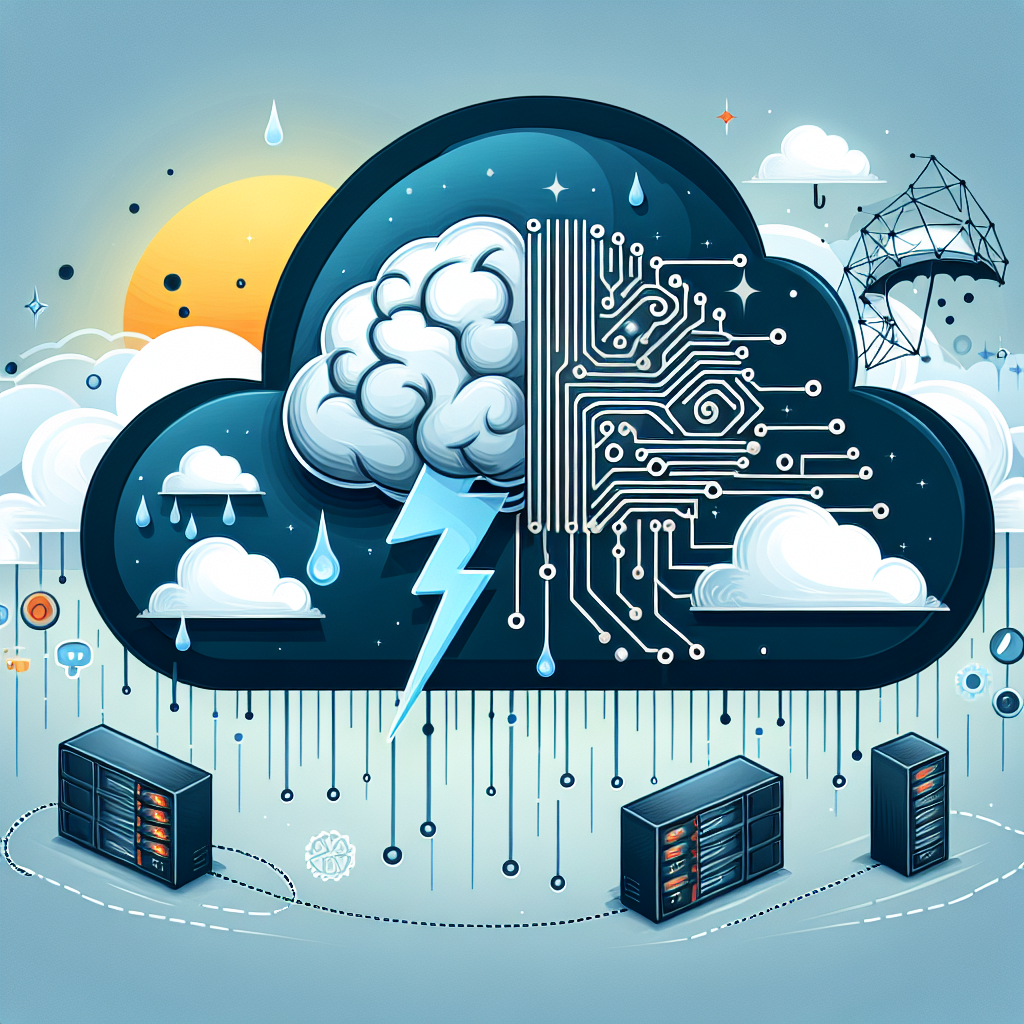In today’s digital age, businesses rely heavily on technology to operate efficiently and effectively. However, with this reliance comes the risk of data loss and system downtime due to natural disasters, cyberattacks, or other unforeseen events. This is where cloud-based disaster recovery and business continuity solutions come into play, offering businesses a way to quickly recover and resume operations in the event of a disruption.
Artificial intelligence (AI) is revolutionizing the way disaster recovery and business continuity solutions are implemented and managed. By leveraging AI technologies, businesses can automate and optimize their disaster recovery processes, making them more efficient and effective. In this article, we will explore the various AI applications for cloud-based disaster recovery and business continuity and how they can help businesses better prepare for and respond to disruptions.
AI Applications for Cloud-Based Disaster Recovery
1. Predictive Analytics: AI-powered predictive analytics can help businesses identify potential risks and vulnerabilities in their IT systems before they occur. By analyzing historical data and patterns, AI algorithms can predict when a disaster is likely to strike and take proactive measures to mitigate the impact.
2. Automated Backup and Recovery: AI can automate the backup and recovery process, ensuring that critical data and systems are always protected and easily recoverable in the event of a disaster. AI algorithms can prioritize which data to back up first, based on its importance to the business, and streamline the recovery process by identifying the most efficient ways to restore systems and applications.
3. Real-Time Monitoring and Alerts: AI can continuously monitor the health and performance of IT systems and infrastructure, detecting anomalies and potential issues in real-time. By setting up alerts and notifications, businesses can be immediately notified of any disruptions or failures, allowing them to take swift action to prevent data loss or downtime.
4. Intelligent Resource Allocation: AI can optimize resource allocation during a disaster recovery scenario, ensuring that critical applications and services receive the necessary resources to operate smoothly. By analyzing workload patterns and performance metrics, AI algorithms can dynamically adjust resource allocation to meet the demands of the business and minimize downtime.
5. Adaptive Disaster Recovery Plans: AI can help businesses create adaptive disaster recovery plans that can quickly respond to changing circumstances and evolving threats. By continuously analyzing data and feedback from previous disasters, AI algorithms can learn from past experiences and recommend improvements to the disaster recovery plan, making it more resilient and effective.
AI Applications for Business Continuity
1. Virtual Workforce: AI-powered virtual assistants and chatbots can help businesses maintain communication and collaboration among employees during a disruption. By providing real-time updates, answering questions, and facilitating remote work, AI can ensure that operations continue smoothly, even when employees are unable to work in the office.
2. Customer Support: AI-powered chatbots can provide automated customer support, answering questions and resolving issues in real-time. By leveraging natural language processing and machine learning, AI chatbots can understand and respond to customer inquiries quickly and accurately, ensuring that business operations remain uninterrupted, even during a disaster.
3. Supply Chain Optimization: AI can optimize supply chain operations by analyzing data and predicting potential disruptions. By identifying alternative suppliers, routes, and resources, AI algorithms can help businesses mitigate the impact of a disaster on their supply chain and ensure that critical goods and services are delivered on time.
4. Remote Monitoring and Management: AI can remotely monitor and manage IT systems and infrastructure, allowing businesses to maintain operations and troubleshoot issues from anywhere. By automating routine tasks and processes, AI can free up IT staff to focus on more critical tasks, ensuring that business operations continue uninterrupted, even during a crisis.
5. Incident Response Automation: AI can automate incident response processes, allowing businesses to quickly identify, contain, and resolve security incidents. By analyzing security logs and alerts in real-time, AI algorithms can detect and respond to threats faster than human operators, minimizing the impact of a cyberattack or data breach on the business.
FAQs
Q: What are the benefits of using AI for cloud-based disaster recovery and business continuity?
A: AI can automate and optimize disaster recovery processes, improve resource allocation, provide real-time monitoring and alerts, and enhance the resilience of business continuity plans, helping businesses better prepare for and respond to disruptions.
Q: How can AI help businesses predict and prevent disasters?
A: AI-powered predictive analytics can analyze historical data and patterns to identify potential risks and vulnerabilities in IT systems, allowing businesses to take proactive measures to prevent disasters before they occur.
Q: Can AI automate the backup and recovery process?
A: Yes, AI can automate the backup and recovery process by prioritizing data backups, streamlining the recovery process, and ensuring that critical data and systems are always protected and easily recoverable in the event of a disaster.
Q: How can AI help businesses maintain communication and collaboration among employees during a disruption?
A: AI-powered virtual assistants and chatbots can help businesses maintain communication and collaboration among employees by providing real-time updates, answering questions, and facilitating remote work, ensuring that operations continue smoothly, even when employees are unable to work in the office.
Q: Is AI capable of optimizing supply chain operations during a disaster?
A: Yes, AI can optimize supply chain operations by analyzing data, predicting potential disruptions, and identifying alternative suppliers, routes, and resources, helping businesses mitigate the impact of a disaster on their supply chain and ensure that critical goods and services are delivered on time.
In conclusion, AI applications for cloud-based disaster recovery and business continuity are transforming the way businesses prepare for and respond to disruptions. By leveraging AI technologies, businesses can automate and optimize their disaster recovery processes, enhance the resilience of their business continuity plans, and ensure that operations continue smoothly, even during a crisis. As AI continues to evolve and improve, businesses can expect even greater benefits and capabilities in the future, making them more resilient and prepared for any challenges that may arise.

